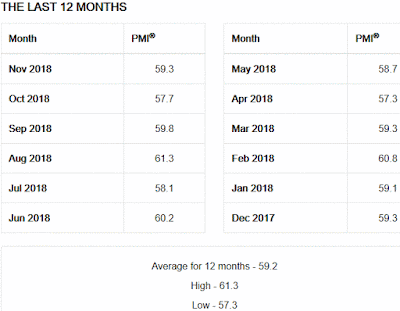ISM Manufacturing Index for November 2018
Earlier today, the Institute for Supply Management® (ISM®) released their Manufacturing Purchasing Manager's Index (PMI®) for November 2018:
Predicted: 57.2%
Actual: 59.3% (+1.6 points month-on-month change)
=========
Previous month: 57.7%
=========
Every month, the ISM surveys purchasing and supply executives at hundreds of companies across the country who are involved in manufacturing in some form. The resulting index is watched closely by academics, economists and investors because manufacturing accounts for about 12% of U.S. Gross Domestic Product (GDP).
The PMI is a reliable barometer of U.S. manufacturing: A PMI above 50% implies that U.S. manufacturing expanded during the month specified, while a reading below 50% implies that the made-in-the-USA sector contracted.
=========
From Today's Report:
The following is a sampling of quotes from a diverse pool of U.S. manufacturers:
=========
=========
Predicted: 57.2%
Actual: 59.3% (+1.6 points month-on-month change)
=========
Previous month: 57.7%
=========
Every month, the ISM surveys purchasing and supply executives at hundreds of companies across the country who are involved in manufacturing in some form. The resulting index is watched closely by academics, economists and investors because manufacturing accounts for about 12% of U.S. Gross Domestic Product (GDP).
The PMI is a reliable barometer of U.S. manufacturing: A PMI above 50% implies that U.S. manufacturing expanded during the month specified, while a reading below 50% implies that the made-in-the-USA sector contracted.
=========
From Today's Report:
"...Economic activity in the manufacturing sector expanded in November, and the overall economy grew for the 115th consecutive month, say the nation’s supply executives in the latest Manufacturing ISM® Report On Business®..."=========
The following is a sampling of quotes from a diverse pool of U.S. manufacturers:
- “Shortages, longer lead times and capacity constraints [particularly in the electronic components marketplace] and tariffs continue to strain the supply chain and disrupt normal business practices and activities.”
(Computer and Electronic Products)
- “Seeing a number [of] areas of slowdown that are concerning: truck market loosening [and] ISO depots full of empty containers, all signs of decreasing business activity.”
(Chemical Products)
- “Production continues at increased levels.”
(Transportation Equipment)
- “Labor shortages in our area are affecting production volumes.”
(Food, Beverage and Tobacco Products)
- “Trade tariffs and commodity increases have greatly affected our ability to remain competitive in the market.”
(Machinery)
- “Business [orders] steady. Many customers [moving] orders up due to price increases [from commodity costs and tariffs].”
(Furniture and Related Products)
- “Business remains strong. Tariffs impact is fully reflected in Q3 results, and initiatives are underway to move work out of China into other low-cost countries.”
(Miscellaneous Manufacturing)
- “A lack of experienced workers is having an impact on production, which impacts sourcing due to the skills gap in the manufacturing trades; particularly computer numeric controlled machinists, but also assemblers and welders. The challenge is meeting customer-delivery requirements for new and repaired equipment.”
(Fabricated Metal Products)
- “Steel tariffs continue to put upward pressure on downstream materials (even when sourcing steel domestically). Long-haul trucking market seems to be normalizing after the implementation of the electronic logging requirements. Oil volatility is also beginning to make its way through downstream materials.”
(Petroleum and Coal Products)
- “Continuing to increase imports in order to receive material in by the end of the year to avoid potential 25-percent tariffs.”
(Nonmetallic Mineral Products)
=========
=========
=========
Labels: hard_data, ism, manufacturing, pmi, purchasing_managers_index
|
--> www.FedPrimeRate.com Privacy Policy <--
CLICK HERE to JUMP to the TOP of THIS PAGE > SITEMAP < |




0 Comments:
Post a Comment
<< Home